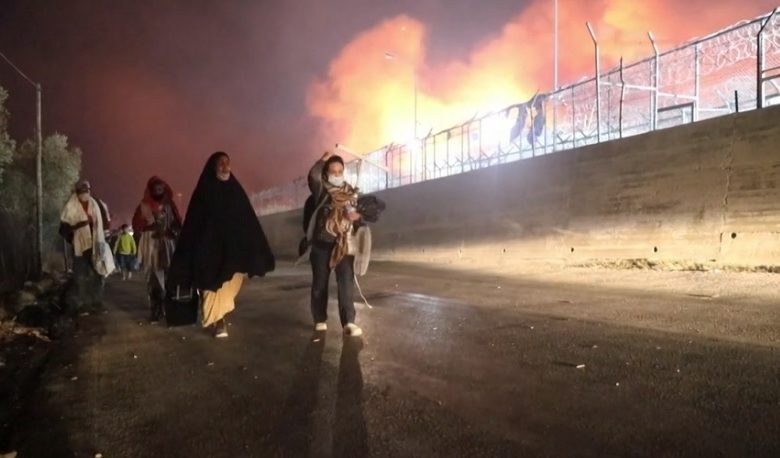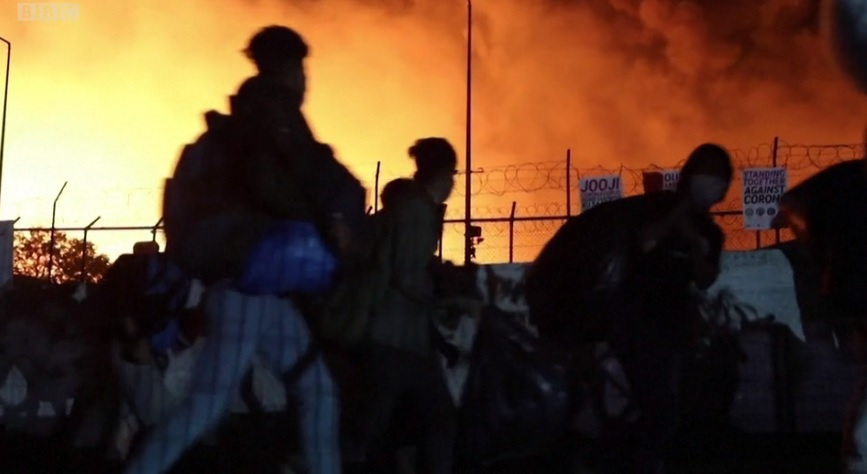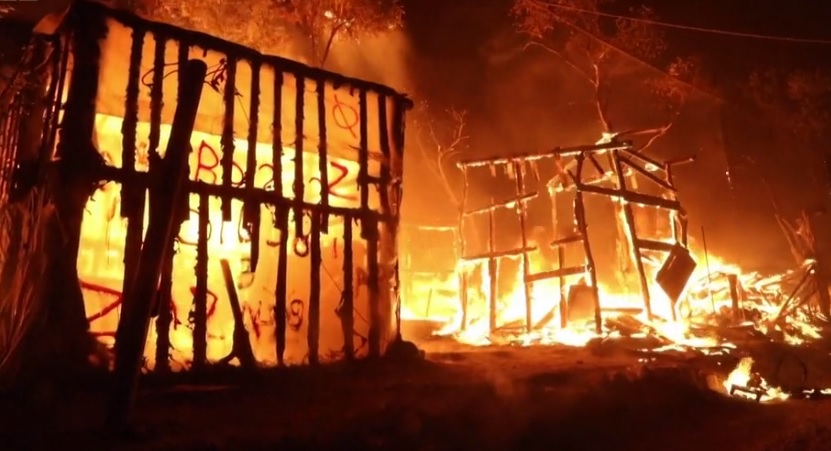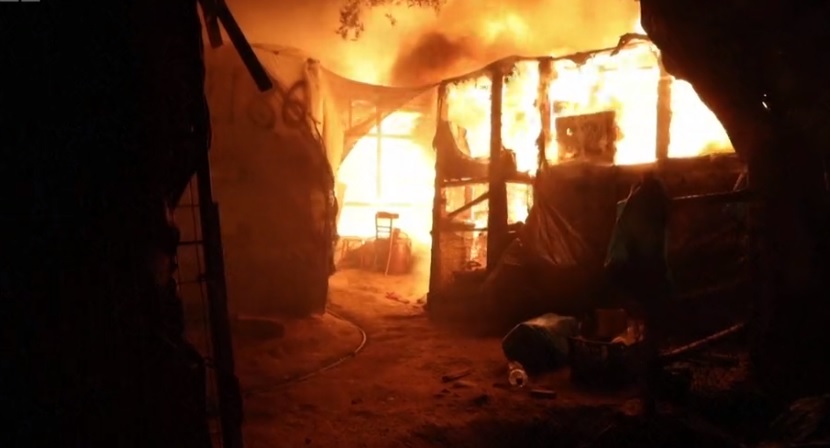
Fires have destroyed Greece’s largest migrant camp, an overcrowded facility on the island of Lesbos, leaving nearly 13,000 people without shelter.
Some 20 firefighters battled the blaze at the Moria camp – designed for fewer than 3,000 people – as migrants, many suffering from smoke exposure, fled.
Greece’s migration minister said the fires “began with the asylum seekers”, but did not elaborate.
Police blocked roads from the camp to prevent migrants entering nearby towns.
Many attempted to carry their belongings to the port town of Mytilene but access was cordoned off. Reports suggest many slept in fields after the fire.
EU home affairs commissioner Ylva Johansson has said she has agreed to finance the transfer of 400 unaccompanied teenagers and children to accommodation on the mainland.
What happened at Moria?
Fires broke out in more than three places in a short space of time, local fire chief Konstantinos Theofilopoulos told state television channel ERT. Some protesting migrants hindered firefighters who tried to tackle the flames, he said.
The main blaze, which was initially fanned by high winds, was put out by Wednesday morning, although Mr Theofilopoulos said there were still some small fires burning inside some containers at the site.
One local resident told the BBC almost the whole camp was burning.
“Now with the first light I can see that there is a few tents that make it, they are okay, but the rest of the camp, as I can see from this distance, is burnt out,” Thanasis Voulgarakis said.
How did the fires start?
It is unclear exactly how the fires started, but Greek Migration Minister Notis Mitarachi said the “incidents in Moria began with the asylum seekers because of the quarantine imposed”. Some of the 35 people who had tested positive for Covid-19 had reportedly refused to move into isolation with their families.
Mr Mitarachi did not say, however, that the fires were a deliberate act of arson aimed at destroying the camp.
Michalis Fratzeskos, deputy mayor for civil protection, told ERT the blaze was “premeditated”. Migrant tents had been empty, he said, and arsonists had “taken advantage of strong winds”.
But some migrants told BBC Persian the fire had broken out after scuffles between migrants and Greek forces at the camp. Several blamed “far-right Greeks” for the blaze after the announcement of coronavirus cases, and took photos of what they said were canisters used to ignite the flames.
Marco Sandrone, Lesbos project co-ordinator for Médecins Sans Frontières (MSF), told the BBC it was difficult to say what had caused the blaze, with several different fires and protests erupting in the camp.
“It’s a time bomb that finally exploded,” he said, adding that people had been kept in “inhumane conditions” at the site for years.
One migrant from Afghanistan, named only as Yaser, told Reuters news agency that the fire had forced everyone to run.
“We don’t know where to go, and all the refugees are outside, and trying to find a place to at least just stay,” he said.
The mayor of Mytilene, Stratis Kytelis, said it was “a very difficult situation because some of those who are outside will include people who are positive [for coronavirus]”.
What has the reaction been?
“The disaster at Moria is total,” Greek migration ministry secretary Manos Logothetis told ANA news agency, and said he was heading to the site.
About 3,000 people are being temporarily housed in tents on Lesbos until alternative shelter can be found, officials said.
European Commission President Ursula von der Leyen said the main priority was “the safety of those left without shelter”.
German foreign minister Heiko Maas described the blaze as a “humanitarian disaster” and tweeted about “the distribution of refugees among those willing to accept admission in the EU”.
Prime Minister of the German state of North Rhine-Westphalia, Armin Laschet, later offered to “take in 1,000 refugees”.
A statement issued by UNHCR, the UN refugee agency, said it was aware of “tensions” between locals and migrants.
“We urge all to exercise restraint,” it said, and asked anyone who had been at the camp “to restrict their movements and stay near [the site], as a temporary solution is being found to shelter them”.
In 2018, UNHCR urged the Greek government to move asylum seekers away from Lesbos, describing conditions as at “boiling point”. At the time, there were 8,000 people living in the Moria camp.
Map showing Moria camp in Greece
For years, thousands of people who arrived on Lesbos were placed in the camp and could not leave until their asylum application was processed on the mainland – a slow, bureaucratic process.
The EU has tried to resettle migrants among different member states but governments across the bloc have rejected different proposals, and migrants have waited in squalid conditions.
In April, Human Rights Watch said the Greek authorities had not done enough to tackle “acute overcrowding” at the site, warning it was not prepared for an outbreak of coronavirus.
The Greek government plan to build closed detention sites to house migrants on the Greek islands. Protesters on Lesbos attacked authorities in February who brought construction equipment to the island.
SOURCE: BBC News










